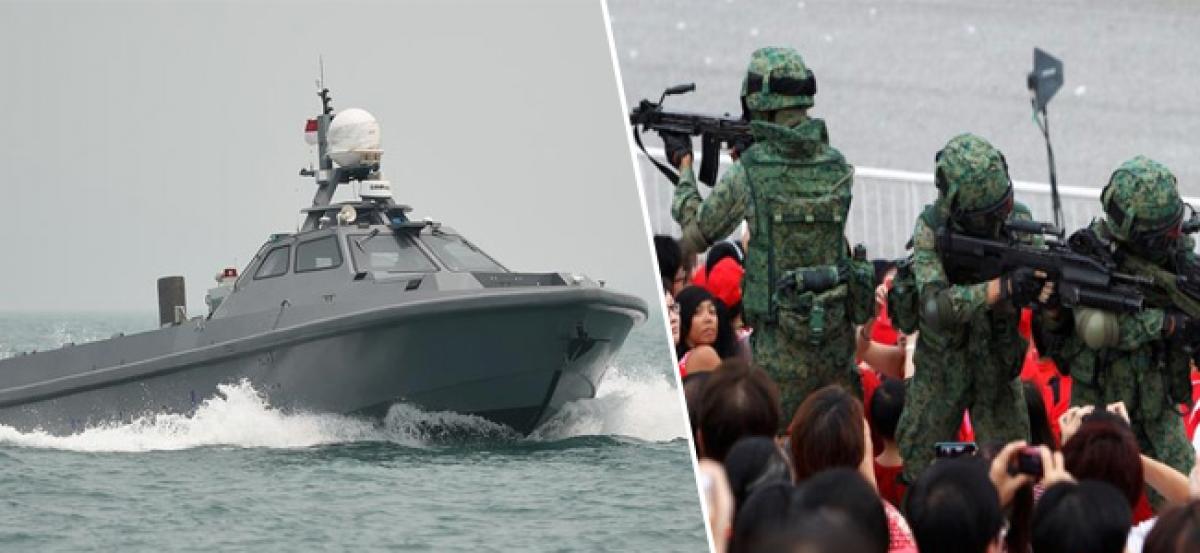Live
- Alia Bhatt captures attention in white
- Varun Dhawan talks about ‘Baby John’
- ‘Moonwalk’ trailer promises a quirky heist, love, and loyalty
- Combat leaf spot disease
- Ahsaas Channaopens up about her complex character in ‘Mismatched 3’
- Radhika Apte welcomes first child, shares heartfelt post
- Jacqueline dazzles at Da-Bangg Reloaded concert
- Time to boost measures to prevent drowning, save children: WHO
- TDP achieves milestone with 73 lakhs membership registration, says Chandrababu
- South Korea: Main Oppn hails Yoon's impeachment motion passage as 'victory for people, democracy'
Just In

A growing threat of terrorism is putting a strain on Singapore\'s small and shrinking army, pushing it towards greater reliance on automation and technology such as unmanned patrol systems to protect the island state, its defence minister Ng Eng Hen said.
SINGAPORE: A growing threat of terrorism is putting a strain on Singapore's small and shrinking army, pushing it towards greater reliance on automation and technology such as unmanned patrol systems to protect the island state, its defence minister Ng Eng Hen said.
The Singapore government earlier this month described the terror threat as the highest in recent years.
The emergence of militants loyal to Islamic State in the Philippines, where security forces have been battling since late May to recapture Marawi City, showed the extent of the danger to Southeast Asia, Ng said.
"It's endemic in our backyard, and the incident in Marawi is but another symptom to tell us that," Ng told reporters, adding Singapore was prepared to deploy ships if asked to help patrol near the area.
Indonesia, Malaysia and the Philippines have stepped up coordinated patrols in the Sulu Sea, separating the southern Philippines island of Mindanao, where Marawi is located, from Malaysian and Indonesian territory on Borneo island.
Ng said it is premature to decide what kind of assistance - aircraft, ships, refueling facilities or medical staff - could be provided, but said it was in Singapore's interests to be involved.
Ng's remarks were made earlier this week but had been embargoed until Friday to mark 50th anniversary of National Service.
In Singapore all males over the age of 18 are required to do two years national service, which involves basic military training for several months before being assigned to either the armed forces, civil defence force or the police force.
With a population of just 5.5 million, Singapore is dwarfed by its mostly Muslim neighbours, and all the countries of the region, including Singapore - which has a sizable Muslim minority of its own - are on guard against radicalisation that could draw people towards militant groups, like Islamic State.
From July, Singapore plans to train 18,000 servicemen annually for homeland security operations.
But its armed forces are expected to sink by one-third by 2030, due to the country's low birth rate.
Ng said that the armed forces plan to increase the use of automation and technology to make up for the reduced manpower.
Singapore's navy, for example, will have two fully autonomous unmanned surface vehicles in operation by 2020.
It is already using artificial intelligence to monitor nearly a thousand vessels passing through Singapore waters daily in order to detect possible threats, according to the defence ministry.
Singapore has a defence partnership with the United States, which allows wider use of the city state's facilities by the U.S. military. It also has defence ties with Indonesia, Malaysia, India, Australia, New Zealand and the UK.

© 2024 Hyderabad Media House Limited/The Hans India. All rights reserved. Powered by hocalwire.com







